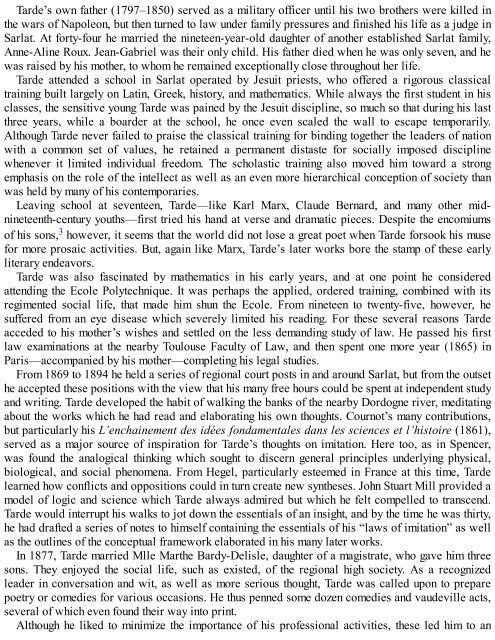3658925934
Create successful ePaper yourself
Turn your PDF publications into a flip-book with our unique Google optimized e-Paper software.
Tarde’s own father (1797–1850) served as a military officer until his two brothers were killed in<br />
the wars of Napoleon, but then turned to law under family pressures and finished his life as a judge in<br />
Sarlat. At forty-four he married the nineteen-year-old daughter of another established Sarlat family,<br />
Anne-Aline Roux. Jean-Gabriel was their only child. His father died when he was only seven, and he<br />
was raised by his mother, to whom he remained exceptionally close throughout her life.<br />
Tarde attended a school in Sarlat operated by Jesuit priests, who offered a rigorous classical<br />
training built largely on Latin, Greek, history, and mathematics. While always the first student in his<br />
classes, the sensitive young Tarde was pained by the Jesuit discipline, so much so that during his last<br />
three years, while a boarder at the school, he once even scaled the wall to escape temporarily.<br />
Although Tarde never failed to praise the classical training for binding together the leaders of nation<br />
with a common set of values, he retained a permanent distaste for socially imposed discipline<br />
whenever it limited individual freedom. The scholastic training also moved him toward a strong<br />
emphasis on the role of the intellect as well as an even more hierarchical conception of society than<br />
was held by many of his contemporaries.<br />
Leaving school at seventeen, Tarde—like Karl Marx, Claude Bernard, and many other midnineteenth-century<br />
youths—first tried his hand at verse and dramatic pieces. Despite the encomiums<br />
of his sons, 3 however, it seems that the world did not lose a great poet when Tarde forsook his muse<br />
for more prosaic activities. But, again like Marx, Tarde’s later works bore the stamp of these early<br />
literary endeavors.<br />
Tarde was also fascinated by mathematics in his early years, and at one point he considered<br />
attending the Ecole Polytechnique. It was perhaps the applied, ordered training, combined with its<br />
regimented social life, that made him shun the Ecole. From nineteen to twenty-five, however, he<br />
suffered from an eye disease which severely limited his reading. For these several reasons Tarde<br />
acceded to his mother’s wishes and settled on the less demanding study of law. He passed his first<br />
law examinations at the nearby Toulouse Faculty of Law, and then spent one more year (1865) in<br />
Paris—accompanied by his mother—completing his legal studies.<br />
From 1869 to 1894 he held a series of regional court posts in and around Sarlat, but from the outset<br />
he accepted these positions with the view that his many free hours could be spent at independent study<br />
and writing. Tarde developed the habit of walking the banks of the nearby Dordogne river, meditating<br />
about the works which he had read and elaborating his own thoughts. Cournot’s many contributions,<br />
but particularly his L’enchainement des idées fondamentales dans les sciences et l’histoire (1861),<br />
served as a major source of inspiration for Tarde’s thoughts on imitation. Here too, as in Spencer,<br />
was found the analogical thinking which sought to discern general principles underlying physical,<br />
biological, and social phenomena. From Hegel, particularly esteemed in France at this time, Tarde<br />
learned how conflicts and oppositions could in turn create new syntheses. John Stuart Mill provided a<br />
model of logic and science which Tarde always admired but which he felt compelled to transcend.<br />
Tarde would interrupt his walks to jot down the essentials of an insight, and by the time he was thirty,<br />
he had drafted a series of notes to himself containing the essentials of his “laws of imitation” as well<br />
as the outlines of the conceptual framework elaborated in his many later works.<br />
In 1877, Tarde married Mlle Marthe Bardy-Delisle, daughter of a magistrate, who gave him three<br />
sons. They enjoyed the social life, such as existed, of the regional high society. As a recognized<br />
leader in conversation and wit, as well as more serious thought, Tarde was called upon to prepare<br />
poetry or comedies for various occasions. He thus penned some dozen comedies and vaudeville acts,<br />
several of which even found their way into print.<br />
Although he liked to minimize the importance of his professional activities, these led him to an









![Genki - An Integrated Course in Elementary Japanese II [Second Edition] (2011), WITH PDF BOOKMARKS!](https://img.yumpu.com/58322134/1/180x260/genki-an-integrated-course-in-elementary-japanese-ii-second-edition-2011-with-pdf-bookmarks.jpg?quality=85)
![Genki - An Integrated Course in Elementary Japanese I [Second Edition] (2011), WITH PDF BOOKMARKS!](https://img.yumpu.com/58322120/1/182x260/genki-an-integrated-course-in-elementary-japanese-i-second-edition-2011-with-pdf-bookmarks.jpg?quality=85)





